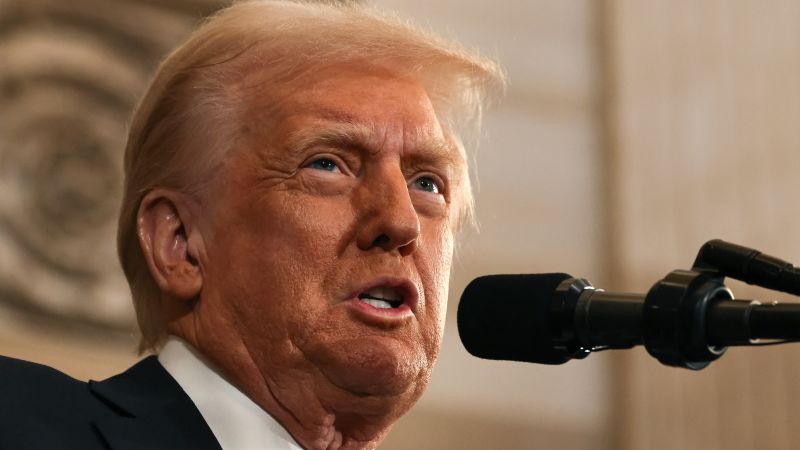
Washington
CNN
—
President Donald Trump on Monday took the first steps to enact his sweeping agenda with a series of executive actions that are expected to kickstart his promised transformation of the federal government.
On the first day of his second term, Trump signed actions that remove the US from the Paris climate agreement, freeze hiring in the federal government and require federal workers to return to the office.
Trump signed those actions following a post-inauguration parade, which was moved indoors because of the cold to Washington’s Capital One Arena. He’s at the White House signing more actions Monday evening, including promised pardons for some of those convicted for their role in the January 6, 2021, attack on the US Capitol.
“With these actions, we will begin the complete restoration of America and the revolution of common sense,” Trump said during his inaugural address after being sworn in as the nation’s 47th president. He added: “The Golden Age of America begins right now.”
The actions are the culmination of multiple pledges Trump made in his successful 2024 campaign, and other initiatives that were floated during his first term but ultimately did not come to pass. They don’t all have a clear path to realization, and some of the most significant actions are likely to be challenged in court.
Here are some of the actions Trump took on his first day in office:
Reversing Biden-era orders
Trump rescinded 78 Biden-era executive actions, many of which Joe Biden signed on the first day of his administration.
The revoked policies include: an executive order that required federal agencies to extend prohibitions on sex discrimination to include sexual orientation and gender identity; an order that required executive branch appointees to sign an ethics pledge; an order that allowed transgender people to serve in the US military; and an order that banned the renewal of private prison contracts.
Freeze federal hiring, bring workers back to office
Trump signed an action enacting a hiring freeze for federal government employees through the executive branch.
“As part of this freeze, no Federal civilian position that is vacant at noon on January 20, 2025, may be filled, and no new position may be created except as otherwise provided for in this memorandum or other applicable law,” reads a memorandum from the White House. The action exempts positions in the military and “related to immigration enforcement, national security, or public safety.”
The action directs the director of the Office of Management and Budget, in consultation with Trump’s new Department of Government Efficiency, to submit a plan within 90 days to reduce the size of the federal government’s workforce “through efficiency improvements and attrition.”
Another action signed by Trump on Monday requires all federal departments and agencies to “take all necessary steps to terminate remote work arrangements and require employees to return to work in-person at their respective duty stations on a full-time basis, provided that the department and agency heads shall make exemptions they deem necessary.”
Environment and energy
Trump on Monday signed an action withdrawing the US again from the Paris climate accord, the emission-lowering agreement that predates his first term in which nearly 200 nations pledged to keep global warming below two degrees Celsius above pre-industrial levels and, if possible, below 1.5 degrees.
Trump pulled out of the agreement during his first term, and one of Biden’s first actions as president was rejoining it. Trump said Monday he would be withdrawing from the agreement, which he called “one-sided,” yet again.
Trump vowed in his inaugural speech to declare a “national energy emergency,” and streamline environmental permitting and review processes that his administration says “impose undue burdens on energy production and use.”
His remarks come in spite of the fact that the US is currently producing more oil than any other country in the history of the world.
This is a developing story and will be updated.


